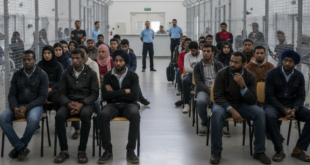The European Court of Justice (ECJ) has issued a landmark ruling that raises the standard for EU countries when designating “safe countries of origin” in asylum procedures. Persons from safe countries of origin have little chance of being granted asylum in the EU.
According to the Court, a country can only be considered safe if all groups within its population, including LGBTQ+ people, women, political opponents and other vulnerable communities, enjoy real and effective protection from persecution or serious harm. If any section of society faces targeted violence, discrimination or systemic neglect, the “safe” status is invalid.
Greater Transparency and Legal Oversight
EU law allows member states to define which countries they view as safe. However, the ECJ ruled that these designations must be open to legal scrutiny. This means governments must reveal the sources and evidence used to justify their safe-country lists so that courts and asylum-seekers can properly assess and challenge them.
The Court made the judgement in a case linked to Italy’s contentious “Albania model”, where migrants mainly single men from Bangladesh and Egypt were to be transferred to offshore processing centres in Albania under a fast-track procedure.
Italy had classified some countries including Bangladesh and Egypt as safe countries of origin, and fast-track procedures were mainly applied to male asylum seekers from those nations. Two affected applicants whose claims were rejected challenged the decision in an Italian court—and won. The court ruled that Bangladesh and Egypt are not safe countries of origin. However, the court in Rome sought further clarification and referred the matter to the ECJ in Luxembourg.
The Albania model is the flagship migration plan of Italy’s Prime Minister Giorgia Meloni. With it, the Italian government aimed to simplify and speed up asylum procedures. Refugees who wanted to apply for asylum in Italy were to be taken to asylum camps outside the EU, in Albania. For this purpose, the Italian government had asylum camps built in the Albanian port cities of Shëngjin and Gjadër. In fast-track procedures, within 28 days, Italian authorities were to decide on the asylum applications.
The legal sticking point: these fast-track procedures are only legally permissible if the refugees come from a safe country of origin. The idea behind this is that anyone coming from such a safe country generally has no claim to asylum anyway. In such cases, it is exceptionally allowed to check, in an expedited process, whether the asylum application can be rejected or if there is any reason against doing so.
The ECJ found that Italy had not provided sufficient information on how it determined certain countries to be safe.
Prime Minister Meloni has criticised the verdict, accusing the Court of overstepping its authority and interfering with national migration policy. The ruling casts further doubts over the Albania model, which has faced other delays and legal hurdles.
Implications Across the EU
Human rights groups have welcomed the judgment as a step towards fairer asylum procedures. Legal experts say it could also affect other EU countries, including Germany, which keeps a list of safe countries. These classifications may now face tighter legal examination under the ECJ’s interpretation.
The decision comes ahead of the implementation of the Common European Asylum System (CEAS) in mid-2026, which will permit specific exemptions for identified vulnerable groups. Until then, the ECJ has made it clear: a country cannot be deemed fully safe if even one part of its population remains unprotected.
Why It Matters for African Asylum-Seekers
For African migrants seeking protection in Europe, the ruling reinforces the importance of individual case reviews and access to legal challenges. It places the burden on governments to prove that a country offers safety to everyone – potentially improving the chances for applicants from marginalised groups to have their claims fully considered.
Felix Dappah
 THE AFRICAN COURIER. Reporting Africa and its Diaspora! The African Courier is an international magazine published in Germany to report on Africa and the Diaspora African experience. The first issue of the bimonthly magazine appeared on the newsstands on 15 February 1998. The African Courier is a communication forum for European-African political, economic and cultural exchanges, and a voice for Africa in Europe.
THE AFRICAN COURIER. Reporting Africa and its Diaspora! The African Courier is an international magazine published in Germany to report on Africa and the Diaspora African experience. The first issue of the bimonthly magazine appeared on the newsstands on 15 February 1998. The African Courier is a communication forum for European-African political, economic and cultural exchanges, and a voice for Africa in Europe.



































